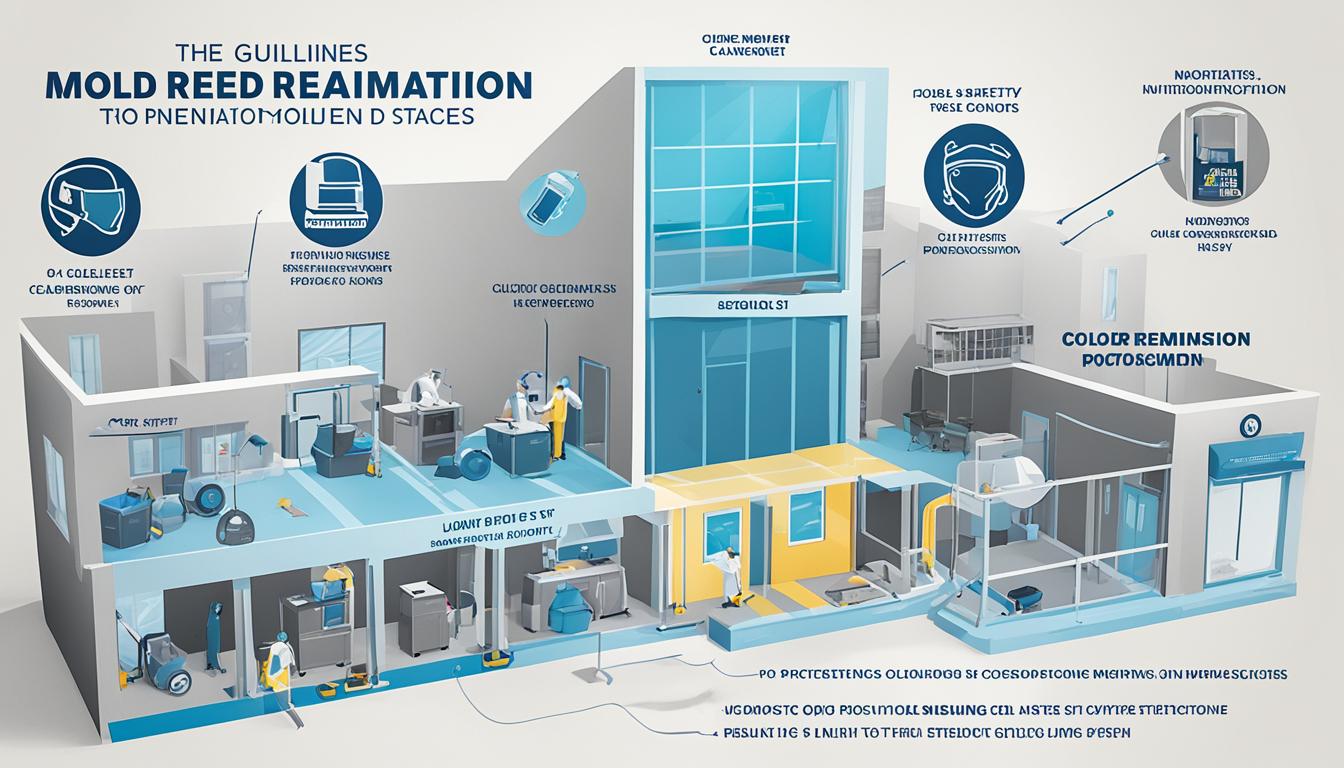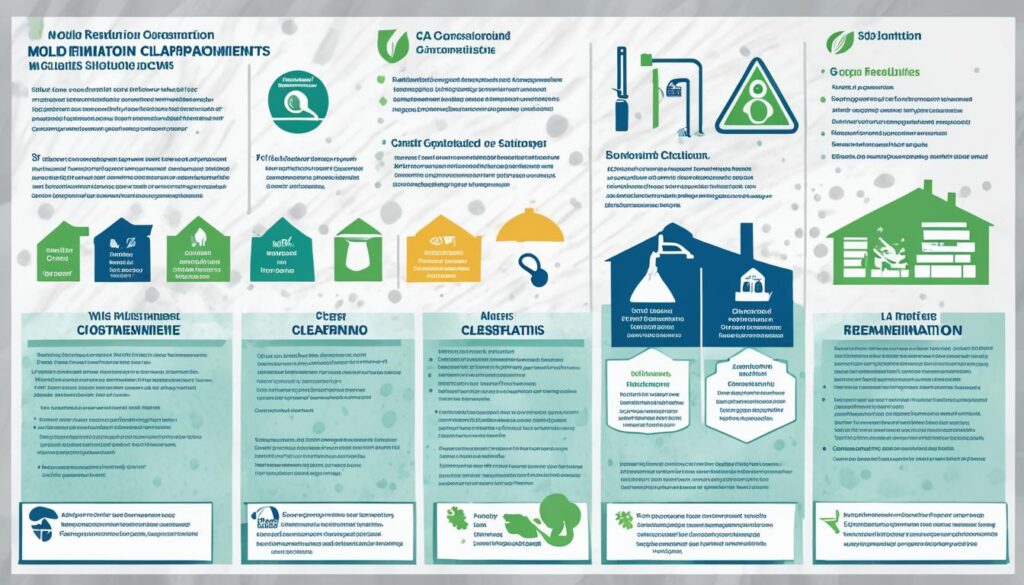
US Mold Remediation Regulations and Guidelines
In this section, we will explore the regulations and guidelines that govern mold remediation in the United States. Understanding these regulations is essential to ensure safe and effective mold treatment and removal.
Key Takeaways:
- Mold remediation regulations and guidelines are crucial for safe and effective mold treatment and removal.
- Complying with federal and state-specific regulations is important when dealing with mold remediation.
- Understanding the procedures and cleanup requirements outlined in the regulations is essential for successful mold mitigation.
- Professional mold assessment services can help ensure compliance with the regulations and guidelines.
- Stay informed about any updates or changes in mold remediation regulations to ensure ongoing compliance.
Federal Regulations and Guidelines
When it comes to mold remediation, federal regulations play a crucial role in ensuring the safety and effectiveness of the cleanup process. These regulations outline the necessary steps and requirements for mold treatment and removal, providing guidelines for professional contractors and individuals alike.
One of the key aspects covered by federal regulations is the establishment of mold remediation laws. These laws dictate the legal obligations and responsibilities of property owners, occupants, and contractors in addressing mold issues.
“It is essential for property owners and contractors to familiarize themselves with the mold remediation laws to ensure compliance and protect the health and well-being of occupants.”
In addition to the laws, federal guidelines also offer specific instructions on mold cleanup requirements. These guidelines provide detailed instructions on the proper procedures for mold removal and treatment, covering aspects such as containment, personal protective equipment, cleaning methods, and disposal of contaminated materials.
Following these guidelines is crucial to effectively address mold issues while minimizing the risk of cross-contamination and exposure to hazardous substances.
Mold Remediation Laws
The mold remediation laws set forth by federal regulations aim to provide a comprehensive framework for addressing mold-related issues. These laws outline the responsibilities and obligations of property owners, occupants, and contractors, ensuring that the necessary actions are taken to mitigate and remove mold.
- Property owners are required to promptly address and remediate any mold issues to maintain a safe and healthy living environment for occupants.
- Occupants should report any signs of mold growth to the property owner or management to initiate the remediation process.
- Contractors must adhere to specific standards and procedures for mold treatment and removal, ensuring proper containment, cleaning, and disposal practices.
Mold Cleanup Requirements
Federal guidelines provide detailed instructions on the proper cleanup requirements for mold remediation. These requirements are designed to ensure that the cleanup process is conducted safely and effectively, minimizing the potential risks associated with mold exposure.
- Containment: Properly isolating the affected area to prevent the spread of mold spores to uncontaminated areas.
- Personal Protective Equipment (PPE): Wearing appropriate PPE, such as gloves, masks, and protective clothing, to minimize exposure to mold spores and contaminants.
- Cleaning Methods: Utilizing effective cleaning methods, such as HEPA vacuuming, damp wiping, and mold-specific disinfectants, to remove mold growth and spores.
- Disposal: Safely disposing of contaminated materials, following proper waste management procedures, to prevent recontamination.

Next, we will explore state-specific regulations and guidelines that provide further insights into mold remediation practices across different regions.
State-Specific Regulations and Guidelines
When it comes to mold remediation, it’s important to note that each state in the United States may have its own specific regulations and guidelines. These regulations are in place to ensure the safe and effective removal and control of mold in residential and commercial properties.
Mold Removal Regulations: State-specific mold removal regulations outline the requirements and procedures for safely removing mold from affected areas. These regulations often specify the necessary containment measures, personal protective equipment (PPE), and disposal methods for mold-infested materials.
Mold Mitigation Guidelines: Mold mitigation guidelines provide recommendations for preventing or reducing the growth and spread of mold. These guidelines may include strategies for moisture control, ventilation, and building maintenance practices to minimize the chances of mold growth in indoor environments.
Mold Control Regulations: State mold control regulations focus on the prevention and containment of mold in buildings. They may address issues such as moisture intrusion prevention, proper ventilation systems, and regular inspections to identify and address potential mold growth areas.
Understanding and adhering to these state-specific regulations and guidelines is crucial for both property owners and professional mold remediation companies. By following these guidelines, individuals can ensure that mold treatment and removal are conducted in a safe and effective manner, protecting the health and well-being of occupants.
It is essential to remember that mold growth can have serious health implications, including respiratory issues and allergies. Therefore, complying with these regulations is crucial to maintaining a healthy living or working environment.
Conclusion
In conclusion, understanding and adhering to the mold remediation regulations and guidelines is crucial for safe and effective mold treatment and removal in the United States. These regulations ensure that proper cleanup procedures are followed and help mitigate the risk of mold-related health issues.
By complying with the mold remediation laws, cleanup requirements, and treatment regulations, individuals and professionals can protect themselves and others from the harmful effects of mold. These regulations provide a framework for mold remediation procedures, ensuring that the process is carried out efficiently and effectively.
If you require professional mold assessment services, Fix Mold Miami is here to help. With our expertise in mold control regulations, mitigation guidelines, and removal regulations, we can assist you in addressing any mold issues you may be facing. Contact us at 305-465-6653 for reliable and comprehensive mold remediation solutions.




